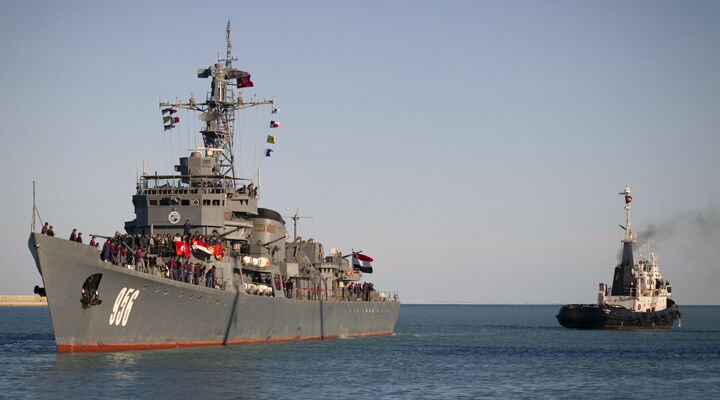
Islamic State Launches Rocket Attack in Mediterranean
Islamic State militants reportedly carried out a rocket attack on an Egyptian frigate in the Mediterranean Sea on Thursday.
An Islamic State affiliate called the Sinai Province of the Islamic State claimed responsibility for the attack. It provided photos showing the incident in question. The dramatic photos of the engulfing fireball and billowing smoke cloud show the missile’s direct strike.
While the photos portrayed a massive attack, the Egyptian military was quick to downplay the incident, claiming there were no casualties and that its military returned fire. Considering the current climate in Egypt, however, the military could merely be playing down the attack in an effort to save face. The rocket strike is just the latest in a string of brazen assaults on Egypt’s ruling administration and military. The attacks consistently portray the government as incapable of countering the rise of radical groups in the Sinai.
Making the attack more embarrassing is the fact that Egypt has, until now, considered the sea as a safe passageway to transport its troops around the Sinai. Over land, military convoys run the risk of ambushes and roadside bombs. Unable to clear the Sinai roads for safe travel, the military began utilizing its navy to ferry troops and weapons. But now even the sea is no longer safe from the Islamic State.
While lacking naval capacity itself, the Islamic State poses a major threat because of its rocket capabilities. Ten thousand shoulder-launched “manpad” missiles went missing from Libya during the Arab Spring. Since that time, the weapons have showed up in Islamic State hands as far away as Syria. Now it seems that these missiles, or some very similar, have found their way into the Sinai desert.
This brings up another major problem: If the Islamic State can target the Mediterranean, it can target the Red Sea.
As one of the busiest sea-lanes in the world, the Red Sea is vital for global trade. A gigantic, cumbersome oil tanker can do little to avoid a militant rocket strike. Tankers need the protection of the military. But now the Egyptian Navy itself is coming under fire.
There have already been attempts by terrorists to attack Red Sea traffic. While most have been thwarted, should Sinai security deteriorate further the ships passing by could be exposed to more serious attacks.
This rocket strike shows the potential the Islamic State now has to disrupt global oil trade and severely undermine the Egyptian administration. The government has announced a maximum state of alert in preparation for the opening of a new route through the Suez Canal next month. The military has been working hard to evict terrorists from the surrounding coastline. The project is expected to more than double Egypt’s current Suez Canal earnings from $5.3 to $13 billion annually.
Aside from Egyptian President Fatah al-Sisi’s government, there are others who fear the rise of the Islamic State. In fact, anyone who enjoys cheap fuel at the gas station should be worried. The Red Sea is a critical artery that connects Middle Eastern oil to large parts of the world. Think of what would happen if terrorists started launching missiles at helpless tankers or other seaborne trade. As tankers sank, the price of oil would rise—dramatically. Consider the global ramifications: Nearly 10 percent of global oil supplies, more than 2 million barrels per day, pass through the Suez Canal and the Red Sea. Roughly 20,000 ships, an average of 55 per day, pass through the Suez Canal and the Red Sea each year. About 15 percent of global maritime tradetravels through the Red Sea. And those numbers look set to rise drastically next month.
Egypt cannot afford to let the Islamic State continue to grow in the Sinai. Neither can the benefactors of this vital shipping lane allow it. Europe and other recipients of goods through the sea-lane will undoubtedly be watching closely to see what is done to mitigate this threat.
Keep watching. As the region descends into chaos, someone will have to step in to secure this crucial sea-lane. Those who rely on the Suez Canal can’t allow the Islamic State to recreate in the Red Sea what it has just done in the Mediterranean.
